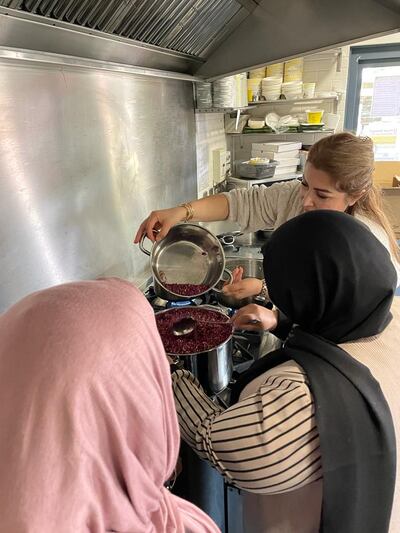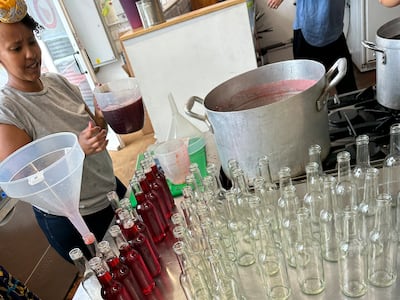Prepared in small batches from sweet recipes of roses, mint and herbs, a cordial made by a collective of refugees from a handful countries is blazing a trail for a new model to assist aspiring business founders among new arrivals to the UK.
After fleeing their homelands, hundreds have been helped by a UK venture that enables refugees to set up businesses.
A report on the initiative, which operates in two areas of England, is calling for the scheme to be introduced wherever there are people struggling for a fresh start.
The Migration Business Support project, which is run by Ashley Community Housing in partnership with the West of England Combined Authority, works with refugees housed in bridging hotels to help them set up business ventures.
More than 640 refugees from about 15 countries, mostly unemployed, have been helped by the scheme over the past two and a half years.
The majority were from Afghanistan, though other participants have included migrants from Syria, Iraq, Iran and Ukraine.
More than 50 varied enterprises across the West Midlands and the south-west have come to fruition, including a crochet start-up, a flash fashion and accessories e-commerce platform, an acupuncture and sports therapy business, and an Egyptian street food venture.
One group of women from Syria, Somalia, Sudan, Afghanistan, Yemen and Pakistan came together to create a business selling cordials made from recipes from their homelands.
A rose and herb recipe proved such a hit that it was showcased at The Royal Horticultural Society Chelsea Flower Show in May. A further batch of 200 bottles have been made for summer fairs.

Fozia Ismail, who now runs her own successful Somali supper club and iced tea community project in Bristol, led the team of women producing the cordials.
The 42-year-old was born in Kuwait and moved to the UK with her mother as a child.
“The Chelsea Flower Show Garden by Jane Porter has roses in it and also some lovely herbs, like thyme and mint. So we thought it would be really nice to incorporate this into a drink,” she said.
“We’ve made two different cordials: one with rose, thyme and lemon and one with hibiscus, lime and mint. They taste quite different but they make very refreshing drinks to pair with ice and sparkling water. They are really delicious.”
Syrian refugee Sherin Ali, 44, said that each of her colleagues brought new ways of making the drinks, using the methods from their homelands.
“The project was very fun,” she said.
“We learnt about professional methods of making a drink – each country has a way of making these types of drinks using different techniques or ingredients. We had a great time and made friends, as well as an excellent product.”

Ali Al Hlayel escaped the war in Syria and settled in Bristol, where he spent two years volunteering at Windmill Hill City Farm and for social enterprise Sims Hill Shared Harvest to grow his knowledge of the UK soil and climate.
Having previously cultivated vegetables, wheat and barley, he wanted to be able to use his skills in the UK.
Last year, he produced his first harvest, with organic rocket being his top performer.
By setting up a JustGiving fundraising page, he raised more than £6,000 to buy a large polytunnel to help scale up his business to allow it to operate all year round.
“The UK welcomed us as refugees. I was so worried about the new country with a different culture and with no family or friends, also I knew nothing about this new community but luckily, I was able to restart my journey as a farmer in the UK,” he said.
Different groups have different rights and entitlements under different schemes in the UK.
Those arriving under legal routes, such as those established for Ukrainians or Afghans, can be entitled to immediate indefinite leave to remain or protected temporary status as well as an unrestricted right to work and housing support. By contrast those who arrive as asylum seekers outside these routes are not entitled to work or claim benefits pending the outcome of their claim
Researchers from the University of Bristol, who compiled a report into the scheme, said the very positive outcomes should be copied beyond the UK.
“This report presents very positive findings about the success of offering comprehensive support to migrant and refugee entrepreneurship in specific UK regions,” said lead author Ann Singleton, reader in migration policy at the University of Bristol.
“It offers important insights for policymakers at a national and local level, which can be applied and rolled out not just across the UK, but also in the European Union and globally.
“All too often, migration in the UK is portrayed negatively, so we are pleased to share results which demonstrate that enthusiasm for work and creative mindsets combined with inclusive policies can support social and economic development across the whole community.”
Bridget Anderson, director of the Migration Mobilities Bristol institute at the University of Bristol, said the scheme was a proven catalyst for positive change.
“This report strongly demonstrates how research can support organisations and communities to bring positive changes in individual lives and for the benefit of society as a whole," she said.
“It provides key practical learnings as well as effective models to nurture new enterprises for national and international policy to adopt.”

